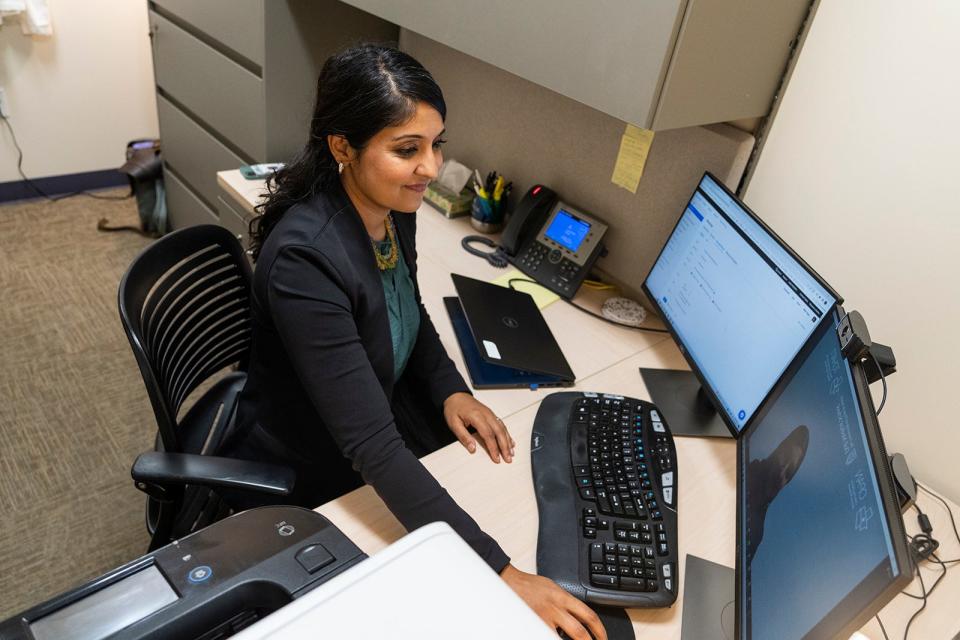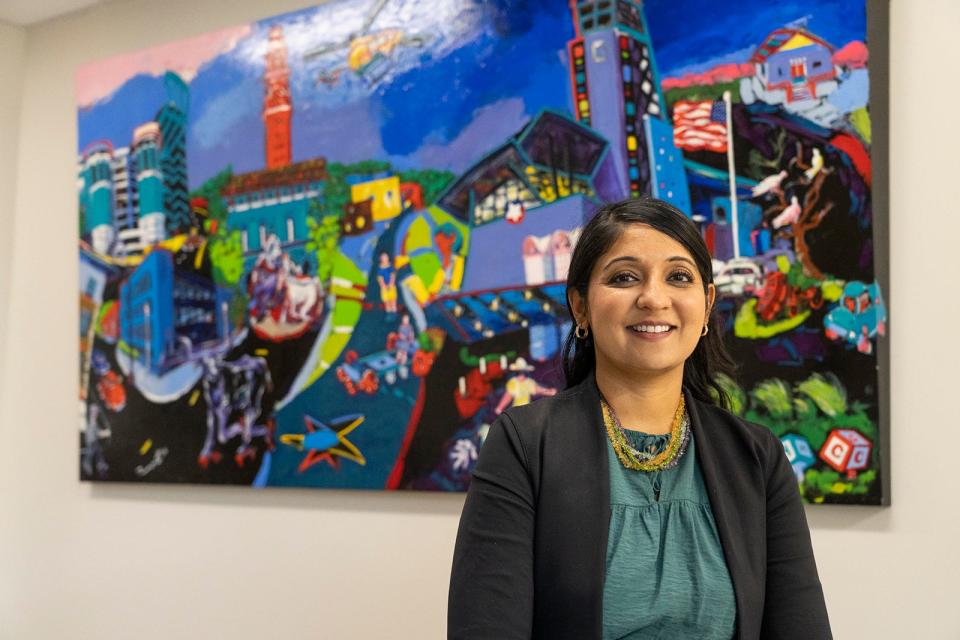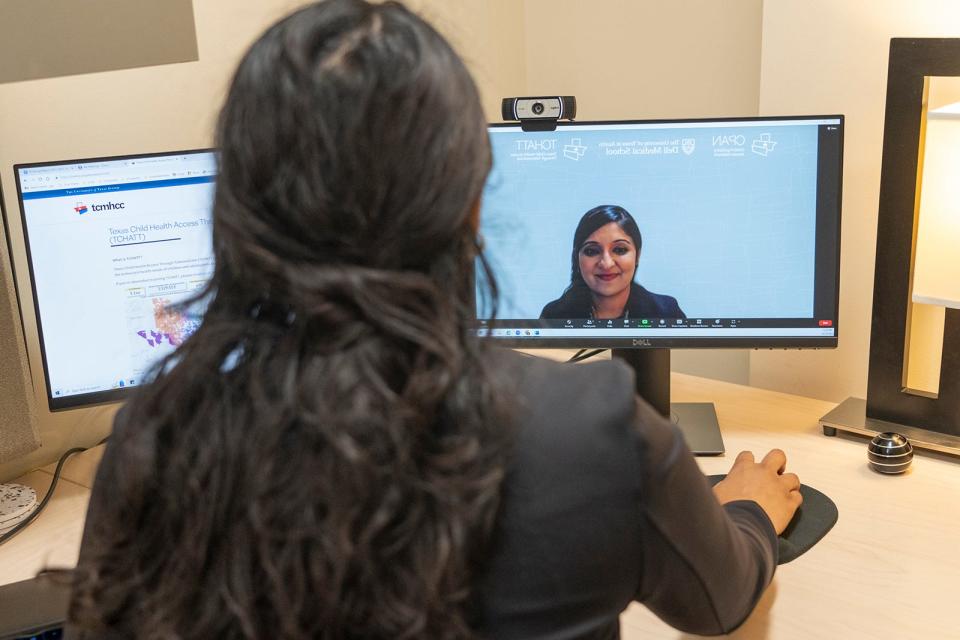New telehealth program will help bring mental health services to Central Texas students
Texas children can have a difficult time accessing mental health care for many reasons: the cost, a lack of transportation and a scarcity of pediatric mental health care providers.
A state program is helping to fill those gaps by bringing virtual care to more than 3.5 million students from the safety of their school.
Texas Child Health Access Through Telemedicine provides school districts with telehealth medicine to identify behavioral needs in students. The program began in 2020 with a consortium of the medical schools in the University of Texas System. The program started with 54 school districts and now has 723.
Twelve medical schools in the state provide care to districts in their area. In Central Texas, the University of Texas Dell Medical School serves more than 303,000 students in 412 campuses from more than 40 districts. Districts that have enrolled include Austin, Bastrop, Round Rock, Eanes, Hays, Lake Travis and Leander.
Dr. Puja Patel, Dell Medical School director of pediatric psychology, said that, with a shortage of pediatric mental health providers in the state, the virtual program can ensure that even students in rural areas get the help they need.
"Normally, providers (in specialized areas) are so rare and so hard to find," Patel said. "But because of telehealth, it really opened up the ability to provide those experts for those kids that need that very specific care."

The program offers students five free telehealth sessions during school hours and connects them to additional support and resources if providers and parents deem that necessary. Patel said when students are referred to long-time care, the program also helps to ensure they can access that help without any barriers.
She said in some cases, more free sessions can be offered.
"I feel very encouraged, as someone in the field of mental health, that Texas has recognized this need and has truly provided funding to support programs that will help create that access, and not in a short-term way," Patel said.
She said the program is tailored to each district to build on existing resources.
District officials in Central Texas say the telehealth program has been successful, with anxiety and depression among the most common struggles they see when referring students.
Round Rock district a program pioneer
The Round Rock school district joined the program in 2020 as part of a pilot launch. Carrie Hontz, the district's counseling service coordinator, said officials wanted to increase access to mental health support for families who face barriers.
"There's a lot of mental health needs in our community right now," Hontz said. "There's not enough support to service all of those needs, especially post-COVID."
According to federal officials, there are 440 "health professional shortage areas" in Texas, affecting nearly 7.5 million people. When considering mental health care professional shortage areas, that figure jumps to 15 million Texans affected.
Hontz said teachers and counselors help identify students who might need the telehealth services. If both the parents and the liaison agree, they are referred to the program. Last school year, the district referred 151 students.

Help with substance abuse
Haley Simmons, the Leander's school district's student family support team coordinator, said students use the program to receive therapy during school for medicine management from a psychiatrist and for substance abuse therapy.
Of the students referred, 57% were from the high school campus and 24% were from middle schools, said Steve Clark, the director of counseling services. Clark said that of 150 students seen by the district's family support team, 64% were referred to Texas Child Health Access Through Telemedicine, 50% of whom were seeking psychiatric help.
"Assessing psychiatry in the community is really hard," Simmons said. "So TCHATT has been really helpful to get our kids who want that connection to medication, along with therapy."
Simmons said that when students cannot get the access they need for their mental health struggles, they miss classes. Because the program is virtual, it allows students to have their appointments during school hours.
Simmons said students with substance abuse issues receive therapy, and if they need long-term care, the program helps to connect them to the right place. Clark said the substances abused by students are marijuana, vaping and alcohol.
"I see it as another resource available for all our students," Clark said of the telehealth program. "This just gives us another level of care for someone who might not be able to have their needs met in the school setting for various reasons."

'Need greater than capacity'
Jennifer Lyon, the Lake Travis school district's director of health and social emotional learning, said officials there have seen an increase in anxiety and depression since the pandemic and that many students don't have the resilience or coping skills to deal with those issues. She said that despite the resources the district has, there is still a need for more.
Lyon said the telehealth program has provided extra resources for its 11,409 students in addition to the district's six social workers and a counselor on its 11 campuses. Lyon said most of the students who are referred to the program are from middle and high schools.
She said the program's virtual counseling has helped decrease access barriers for the district's uninsured and underinsured students. She said the availability of psychiatric support is helpful because it can be difficult to find psychiatrists for teens and young children.
"The need is always greater than the capacity and probably will continue to be that way in Texas for quite a while," Lyon said. "So as many resources we can get to find the right fit for what works for each student is really the best-case scenario."
Lack of transportation an issue
Heather Hohertz, the Bastrop school district's student and family support services coordinator, said that with only 10 support specialists for its 14 campuses, they cannot always treat students' problems, and, at times, the students need more help than the district can offer.
She also said for families in the district, transportation issues can limit access to mental health. She said the virtual program reduces that barrier for families and ensures that students don't miss school.
"One of the issues we have, being part of a more rural area, is mental health assistance," Hohertz said. "Transportation is a huge issue for our families, so it is hard for them to get to mental health support in the area."
Program 'a blessing' at Hays district
At least one student in each of the Hays school district's 25 campuses has used the program, said Maritza Gonzales, the district's director of guidance, counseling and college and career readiness. She said that 130 students were referred to the program last year, mostly from the high school campuses.
Gonzales said the virtual program is a great model to give students the support they need.
"Here at Hays CISD, (the telehealth program) has been such a great blessing," Gonzalez said. "It's a great resource. We're a fast-growing district, but often times we don't have as many resources in the area."
No longer 'competing for appointments'
Heidi Sauer, coordinator of counseling and social emotional learning at the Eanes school district, said that despite assumptions that the district is wealthy, health care affordability and access can still be an issue. She said the ability to have appointments during the school day benefits students because they don't have to be pulled out of class and don't have to find transportation.
"The telehealth program is creating a way for student youths to access mental health support and not be competing for appointments with adults out in the community," Sauer said.
It is important for students to have the mental health therapy they need to avoid any negative long-term effects, said Andy Miller, director of the Austin Child Guidance Center, a nonprofit that provides mental health services to children and their families. Miller said that telehealth medicine can be a great tool to remove barriers to care, but it must be used effectively to reach treatment goals because there are things you can do in person that you can't online.
"The reality is we have so far to go in providing adequate and accessible mental health services," Miller said. "So, anything that improves access and created more opportunity is a great thing."
This article originally appeared on Austin American-Statesman: New telehealth program brings mental health services to Texas students

